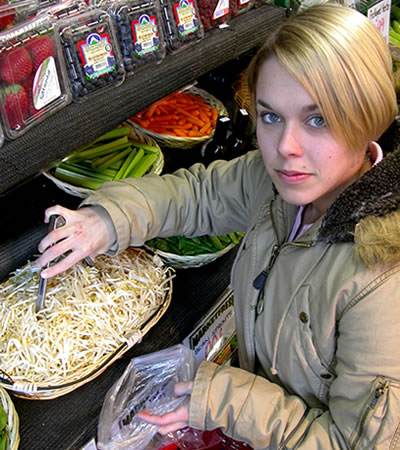This is why I stopped being interested in survey research, oh, about 15 years ago.
The University of Guelph today announced that a new survey had found a majority of Canadians have changed their buying and consumption behaviour following the recall associated with listeria in ready-to-eat meats. If people said so, it must be true..jpg) "The listeriosis outbreak was not only associated with the death of 20 people and the illness of many others, but it also contributed to economic loss in the food industry," said Prof. John Cranfield of the Department of Food, Agricultural and Resource Economics.
"The listeriosis outbreak was not only associated with the death of 20 people and the illness of many others, but it also contributed to economic loss in the food industry," said Prof. John Cranfield of the Department of Food, Agricultural and Resource Economics.
Uh, yup.
"Before the food recall, consumers did not consider the potential risks of ready-to-eat meats to be significant," Cranfield said.
That’s because no one, even listeria guru Michael McCain, said anything about the risks.
So, with a lot of death, illness and massive media coverage, consumers became more aware.
The press release also says, in something that is tragically not interesting, that,
“Interestingly, although overall confidence in food safety in Canada remains high, consumers’ trust in food-chain stakeholders to protect them from listeria is only moderate, the researchers found. Farmers were judged to have the greatest ability to ensure the safety of food, whereas restaurants, grocery stores and the food-service sector were deemed to have the least ability.”
What farmers have to do with listeria in deli-meats is beyond me; maybe a university puckering a little too tightly to a constituency?
The press release gushes that,
“The survey is the second to be produced as part of the Guelph Food Panel, the first large-scale panel of consumers dedicated to food research. Developed by Henson, Cranfield and post-doctoral researcher Oliver Masakure, it allows researchers to accurately track changes in Canadians’ eating habits and measure consumer responses to issues such as food scares.”
20 dead isn’t a food scare. It’s a food screw-up.

 Cameron Clark, health protection program manager with Wellington-Dufferin-Guelph Public Health said the outbreak served “as a reminder for anyone who ate at the campus from that date on, or has experienced symptoms of extreme diarrhea, stomach cramps, nausea and vomiting to contact public health.”
Cameron Clark, health protection program manager with Wellington-Dufferin-Guelph Public Health said the outbreak served “as a reminder for anyone who ate at the campus from that date on, or has experienced symptoms of extreme diarrhea, stomach cramps, nausea and vomiting to contact public health.” The Wellington-Dufferin-Guelph Public Health unit says
The Wellington-Dufferin-Guelph Public Health unit says I had just posted a blog about the E. coli O157 outbreak at the University of Guelph, and was all chatty about that, so I said to my hair person, Virginia, if you made 6-figures running some aspect of a university, and 20 people got sick from eating in one of your food service outlets, what would you say?
I had just posted a blog about the E. coli O157 outbreak at the University of Guelph, and was all chatty about that, so I said to my hair person, Virginia, if you made 6-figures running some aspect of a university, and 20 people got sick from eating in one of your food service outlets, what would you say?
 Of course, no one from Health Canada or PHAC unsubscribed from the listservs.
Of course, no one from Health Canada or PHAC unsubscribed from the listservs.  So says t
So says t.jpg) Seven years after a newspaper series focused attention on r
Seven years after a newspaper series focused attention on r